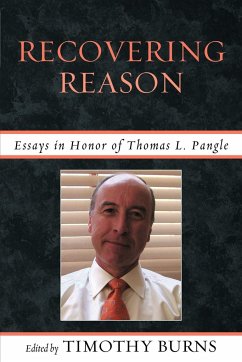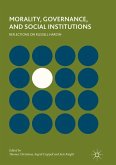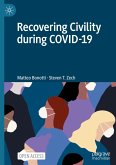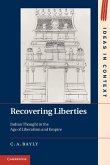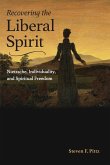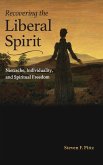Recovering Reason
Essays in Honor of Thomas L. Pangle
Herausgeber: Burns, Timothy
Recovering Reason
Essays in Honor of Thomas L. Pangle
Herausgeber: Burns, Timothy
- Broschiertes Buch
- Merkliste
- Auf die Merkliste
- Bewerten Bewerten
- Teilen
- Produkt teilen
- Produkterinnerung
- Produkterinnerung
Recovering Reason: Essays in Honor of Thomas L. Pangle is a collection of essays composed by students and friends of Thomas L. Pangle to honor his seminal work and outstanding guidance in the study of political philosophy. These essays examine both Socrates' and modern politic...
Andere Kunden interessierten sich auch für
![Recovering Reason Recovering Reason]() Recovering Reason202,99 €
Recovering Reason202,99 €![Morality, Governance, and Social Institutions Morality, Governance, and Social Institutions]() Morality, Governance, and Social Institutions88,99 €
Morality, Governance, and Social Institutions88,99 €![Recovering Civility during COVID-19 Recovering Civility during COVID-19]() Matteo BonottiRecovering Civility during COVID-1937,99 €
Matteo BonottiRecovering Civility during COVID-1937,99 €![Recovering Liberties Recovering Liberties]() C. A. BaylyRecovering Liberties79,99 €
C. A. BaylyRecovering Liberties79,99 €![Recovering Civility during COVID-19 Recovering Civility during COVID-19]() Matteo BonottiRecovering Civility during COVID-1930,99 €
Matteo BonottiRecovering Civility during COVID-1930,99 €![Recovering the Liberal Spirit Recovering the Liberal Spirit]() Steven F. PittzRecovering the Liberal Spirit40,99 €
Steven F. PittzRecovering the Liberal Spirit40,99 €![Recovering the Liberal Spirit Recovering the Liberal Spirit]() Steven F. PittzRecovering the Liberal Spirit109,99 €
Steven F. PittzRecovering the Liberal Spirit109,99 €-
-
-
Recovering Reason: Essays in Honor of Thomas L. Pangle is a collection of essays composed by students and friends of Thomas L. Pangle to honor his seminal work and outstanding guidance in the study of political philosophy. These essays examine both Socrates' and modern politic...
Hinweis: Dieser Artikel kann nur an eine deutsche Lieferadresse ausgeliefert werden.
Hinweis: Dieser Artikel kann nur an eine deutsche Lieferadresse ausgeliefert werden.
Produktdetails
- Produktdetails
- Verlag: Lexington Books
- Seitenzahl: 502
- Erscheinungstermin: 6. August 2010
- Englisch
- Abmessung: 229mm x 152mm x 27mm
- Gewicht: 720g
- ISBN-13: 9780739146323
- ISBN-10: 0739146327
- Artikelnr.: 30365376
- Herstellerkennzeichnung
- Books on Demand GmbH
- In de Tarpen 42
- 22848 Norderstedt
- info@bod.de
- 040 53433511
- Verlag: Lexington Books
- Seitenzahl: 502
- Erscheinungstermin: 6. August 2010
- Englisch
- Abmessung: 229mm x 152mm x 27mm
- Gewicht: 720g
- ISBN-13: 9780739146323
- ISBN-10: 0739146327
- Artikelnr.: 30365376
- Herstellerkennzeichnung
- Books on Demand GmbH
- In de Tarpen 42
- 22848 Norderstedt
- info@bod.de
- 040 53433511
Timothy Burns is an associate professor of government at Skidmore College.
1 Acknowledgements 2 Introduction Part 3 I: Pre-Socratic Thought Chapter 4
1. Homer and the Foundation of Classical Civilization Chapter 5 2.
Prometheus and Oedipus: The Arrogance and Limits of Art and Reason Chapter
6 3. What War Discloses Chapter 7 4. The Classical Rationalism of
Thucydides Chapter 8 5. The Aristophanic Question Chapter 9 6. On the Power
of Rhetoric: Gorgias and the Philosophic Foundation of Sophistry Part 10
Part II: Socratic Rationalism Chapter 11 7. Socrates and the Sophists
Chapter 12 8. Thrasymachus' Blush Chapter 13 9. Civic or Human Virtue in
Aristotle's Politics Chapter 14 10. Happiness in the Perspective of
Philosophy Chapter 15 11. The Problem of Providence in Maimonides' Guide of
the Perplexed Chapter 16 12. A Slingshot Recoils: The Critique of
Philosophy in Halevi's Kuzari Part 17 III: On Leo Strauss Chapter 18 13.
Thinking Nietzsche Through and Strauss's Recovery of Classical Political
Philosophy Chapter 19 14. John Toland and Leo Strauss on Esoteric Writing
Chapter 20 15. Did Plato Believe in his own Metaphysics? And Did Strauss?
Chapter 21 16. Leo Strauss on Machiavelli and the Origins of Modernity Part
22 IV: Modern Political Philosophy Chapter 23 17. Aristotelian Kingship and
Lockean Prerogative Chapter 24 18. "For Which Human Nature Can Never Be Too
Grateful": Montesquieu as the Heir of Christianity Chapter 25 19. "They
Flock Into Cities; Their Situation is Less Precarious": David Hume and the
Intellectual Origins of the American Founding Chapter 26 20. Rousseau on
the Philosophic Life Les rêveries du Promeneur Solitaire Chapter 27 21.
Schiller on Aesthetic Education: Radicalization by Return Chapter 28 22.
Stendhal and the Promise of Happiness: An Introduction to the Charterhouse
of Parma Chapter 29 23. Tocqueville's Burke, or Story as History Part 30 V:
Contemporary Issues and political philosophy Chapter 31 24. Corrupting or
Edifying? Cato the Elder and Cicero on the Role of Philosophy in Roman
Civic Education Chapter 32 25. Abstract Painting and the Rule of Doubt
Chapter 33 26. Kissinger and Thucydides Chapter 34 27. Charles Taylor as a
Theorist of MulticulturalismRecognition/Authenticity Chapter 35 28.
Neuroplasticity, Perfectibility, and Three Ideas of Nature 36 Bibliography
of the Published Work of Thomas L. Pangle 37 Index 38 About the
Contributors
1. Homer and the Foundation of Classical Civilization Chapter 5 2.
Prometheus and Oedipus: The Arrogance and Limits of Art and Reason Chapter
6 3. What War Discloses Chapter 7 4. The Classical Rationalism of
Thucydides Chapter 8 5. The Aristophanic Question Chapter 9 6. On the Power
of Rhetoric: Gorgias and the Philosophic Foundation of Sophistry Part 10
Part II: Socratic Rationalism Chapter 11 7. Socrates and the Sophists
Chapter 12 8. Thrasymachus' Blush Chapter 13 9. Civic or Human Virtue in
Aristotle's Politics Chapter 14 10. Happiness in the Perspective of
Philosophy Chapter 15 11. The Problem of Providence in Maimonides' Guide of
the Perplexed Chapter 16 12. A Slingshot Recoils: The Critique of
Philosophy in Halevi's Kuzari Part 17 III: On Leo Strauss Chapter 18 13.
Thinking Nietzsche Through and Strauss's Recovery of Classical Political
Philosophy Chapter 19 14. John Toland and Leo Strauss on Esoteric Writing
Chapter 20 15. Did Plato Believe in his own Metaphysics? And Did Strauss?
Chapter 21 16. Leo Strauss on Machiavelli and the Origins of Modernity Part
22 IV: Modern Political Philosophy Chapter 23 17. Aristotelian Kingship and
Lockean Prerogative Chapter 24 18. "For Which Human Nature Can Never Be Too
Grateful": Montesquieu as the Heir of Christianity Chapter 25 19. "They
Flock Into Cities; Their Situation is Less Precarious": David Hume and the
Intellectual Origins of the American Founding Chapter 26 20. Rousseau on
the Philosophic Life Les rêveries du Promeneur Solitaire Chapter 27 21.
Schiller on Aesthetic Education: Radicalization by Return Chapter 28 22.
Stendhal and the Promise of Happiness: An Introduction to the Charterhouse
of Parma Chapter 29 23. Tocqueville's Burke, or Story as History Part 30 V:
Contemporary Issues and political philosophy Chapter 31 24. Corrupting or
Edifying? Cato the Elder and Cicero on the Role of Philosophy in Roman
Civic Education Chapter 32 25. Abstract Painting and the Rule of Doubt
Chapter 33 26. Kissinger and Thucydides Chapter 34 27. Charles Taylor as a
Theorist of MulticulturalismRecognition/Authenticity Chapter 35 28.
Neuroplasticity, Perfectibility, and Three Ideas of Nature 36 Bibliography
of the Published Work of Thomas L. Pangle 37 Index 38 About the
Contributors
1 Acknowledgements 2 Introduction Part 3 I: Pre-Socratic Thought Chapter 4
1. Homer and the Foundation of Classical Civilization Chapter 5 2.
Prometheus and Oedipus: The Arrogance and Limits of Art and Reason Chapter
6 3. What War Discloses Chapter 7 4. The Classical Rationalism of
Thucydides Chapter 8 5. The Aristophanic Question Chapter 9 6. On the Power
of Rhetoric: Gorgias and the Philosophic Foundation of Sophistry Part 10
Part II: Socratic Rationalism Chapter 11 7. Socrates and the Sophists
Chapter 12 8. Thrasymachus' Blush Chapter 13 9. Civic or Human Virtue in
Aristotle's Politics Chapter 14 10. Happiness in the Perspective of
Philosophy Chapter 15 11. The Problem of Providence in Maimonides' Guide of
the Perplexed Chapter 16 12. A Slingshot Recoils: The Critique of
Philosophy in Halevi's Kuzari Part 17 III: On Leo Strauss Chapter 18 13.
Thinking Nietzsche Through and Strauss's Recovery of Classical Political
Philosophy Chapter 19 14. John Toland and Leo Strauss on Esoteric Writing
Chapter 20 15. Did Plato Believe in his own Metaphysics? And Did Strauss?
Chapter 21 16. Leo Strauss on Machiavelli and the Origins of Modernity Part
22 IV: Modern Political Philosophy Chapter 23 17. Aristotelian Kingship and
Lockean Prerogative Chapter 24 18. "For Which Human Nature Can Never Be Too
Grateful": Montesquieu as the Heir of Christianity Chapter 25 19. "They
Flock Into Cities; Their Situation is Less Precarious": David Hume and the
Intellectual Origins of the American Founding Chapter 26 20. Rousseau on
the Philosophic Life Les rêveries du Promeneur Solitaire Chapter 27 21.
Schiller on Aesthetic Education: Radicalization by Return Chapter 28 22.
Stendhal and the Promise of Happiness: An Introduction to the Charterhouse
of Parma Chapter 29 23. Tocqueville's Burke, or Story as History Part 30 V:
Contemporary Issues and political philosophy Chapter 31 24. Corrupting or
Edifying? Cato the Elder and Cicero on the Role of Philosophy in Roman
Civic Education Chapter 32 25. Abstract Painting and the Rule of Doubt
Chapter 33 26. Kissinger and Thucydides Chapter 34 27. Charles Taylor as a
Theorist of MulticulturalismRecognition/Authenticity Chapter 35 28.
Neuroplasticity, Perfectibility, and Three Ideas of Nature 36 Bibliography
of the Published Work of Thomas L. Pangle 37 Index 38 About the
Contributors
1. Homer and the Foundation of Classical Civilization Chapter 5 2.
Prometheus and Oedipus: The Arrogance and Limits of Art and Reason Chapter
6 3. What War Discloses Chapter 7 4. The Classical Rationalism of
Thucydides Chapter 8 5. The Aristophanic Question Chapter 9 6. On the Power
of Rhetoric: Gorgias and the Philosophic Foundation of Sophistry Part 10
Part II: Socratic Rationalism Chapter 11 7. Socrates and the Sophists
Chapter 12 8. Thrasymachus' Blush Chapter 13 9. Civic or Human Virtue in
Aristotle's Politics Chapter 14 10. Happiness in the Perspective of
Philosophy Chapter 15 11. The Problem of Providence in Maimonides' Guide of
the Perplexed Chapter 16 12. A Slingshot Recoils: The Critique of
Philosophy in Halevi's Kuzari Part 17 III: On Leo Strauss Chapter 18 13.
Thinking Nietzsche Through and Strauss's Recovery of Classical Political
Philosophy Chapter 19 14. John Toland and Leo Strauss on Esoteric Writing
Chapter 20 15. Did Plato Believe in his own Metaphysics? And Did Strauss?
Chapter 21 16. Leo Strauss on Machiavelli and the Origins of Modernity Part
22 IV: Modern Political Philosophy Chapter 23 17. Aristotelian Kingship and
Lockean Prerogative Chapter 24 18. "For Which Human Nature Can Never Be Too
Grateful": Montesquieu as the Heir of Christianity Chapter 25 19. "They
Flock Into Cities; Their Situation is Less Precarious": David Hume and the
Intellectual Origins of the American Founding Chapter 26 20. Rousseau on
the Philosophic Life Les rêveries du Promeneur Solitaire Chapter 27 21.
Schiller on Aesthetic Education: Radicalization by Return Chapter 28 22.
Stendhal and the Promise of Happiness: An Introduction to the Charterhouse
of Parma Chapter 29 23. Tocqueville's Burke, or Story as History Part 30 V:
Contemporary Issues and political philosophy Chapter 31 24. Corrupting or
Edifying? Cato the Elder and Cicero on the Role of Philosophy in Roman
Civic Education Chapter 32 25. Abstract Painting and the Rule of Doubt
Chapter 33 26. Kissinger and Thucydides Chapter 34 27. Charles Taylor as a
Theorist of MulticulturalismRecognition/Authenticity Chapter 35 28.
Neuroplasticity, Perfectibility, and Three Ideas of Nature 36 Bibliography
of the Published Work of Thomas L. Pangle 37 Index 38 About the
Contributors

